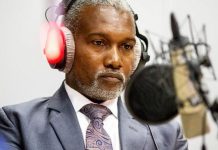SWAN decries authorities neglect in major sports tourneys
Austin Ajayi
Sports Writers Association of Nigeria (SWAN) has decried the total neglect of it’s members attending major sporting competitions within and outside the country, stressing that Nigerian Sports Journalists deserve better attention, recognition for years of hard work and dedication.
The Association called on the National Sports Commission (NSC), and other stakeholders to give long-overdue recognition, support, and reward to Nigerian sports journalists who have, for decades, contributed significantly to the growth and development of sports in the country, often at great personal cost.
Related news
Our visit to Buhari is for courtesies not politics – Atiku
NFF president commends Fintiri’s giant strides in sports development
Nimrod urges Tinubu to create ministry of sports dev
In a statement released on Tuesday by SWAN Secretary-General, Ambassador Ikenna Okonkwo, on behalf of President Mr. Isaiah Benjamin, the association decried the neglect of sports journalists by key actors in the Nigerian sports industry, despite their vital and visible roles.
The SWAN President, noted that unlike what obtains in other parts of the world, the Media in Nigeria are often left to their fate, a situation he described as appalling and unacceptable.
While highlighting the numerous contributions of teeming Sports Journalists who play vital role in both the early and advanced stages of Athletes, Technical Officials and Administrators, President Benjamin said, “Journalists pay their way through to attend and cover proceedings at competitions (both local and international).
They face the rigors of weather, harsh or high transportation and accommodation costs, coupled with many associated risks, yet administrators and others see and treat them with disdain.”
Citing the just-concluded 2024 CAF Women’s Africa Cup of Nations (WAFCON) in Morocco, SWAN said over 25 Nigerian sports journalists attended the tournament through personal funding, receiving no institutional or governmental sponsorship.
These journalists, beyond covering the event, also stood out as passionate supporters of the Super Falcons in the stands, amplifying the team’s morale and visibility throughout the competition.
“The experience of a regular sports journalist in Nigeria is so pathetic that a number of us pass through a lot without getting any assistance or rewards whatsoever,” President Benjamin said.
He added: “Journalists pay their way through to attend and cover proceedings at competitions (both local and international). They face the rigours of weather, harsh or high transportation and accommodation costs, coupled with many associated risks, yet administrators and others see and treat them with disdain.
“Despite playing a leading role in the development of sports from month to month, year to year, journalists in Nigeria are highly under-valued by administrators, including those placed at high and strategic positions who should know better.”
President Benjamin commended President Bola Ahmed Tinubu, state governors, and past Nigerian leaders for rewarding athletes and technical officials with cash, houses, and national honours for their achievements. However, he stressed that the media, who play a foundational role in amplifying these successes, must also be acknowledged.
“Yes, the athletes and technical officials deserve to be rewarded and celebrated. However, journalists as humans, who have shown greater dedication in championing the sporting, nay economic growth for Nigeria, deserve more.
“In other climes, the government, corporate organisations, and sports bodies do so much in ensuring that the sporting media are taken care of one way or the other, but in Nigeria, even the sports professionals, including highly placed officials at the then Ministry of Sports, now National Sports Commission (NSC), see media as a mere appendage—which ought not to be so.
“Most times, during the planning and execution of sporting programmes and activities, the administrators intentionally sideline the media,” he said.
Referring again to the trend of exclusion, Benjamin questioned the motives of administrators who rely on the media durin















